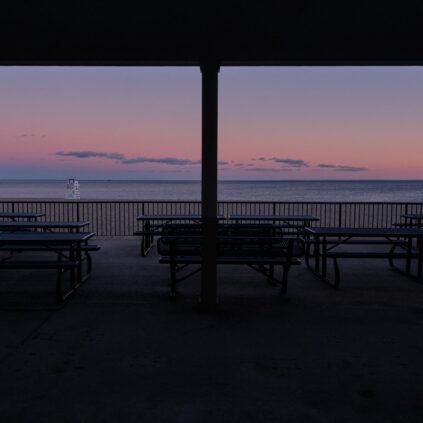I have butterflies in my stomach,? Charlie Pillsbury tells us, smiling
hopefully as he guides his bicycle into the street. In spite of his
silver beard, khaki shorts, and bike helmet, he speaks to the cluster
of reporters and carries himself in a way that reminds me of Gregory
Peck playing Atticus Finch in To Kill A Mockingbird. The four of us
accompanying Charlie on the ride finish stretching, eager to begin.
Swinging our legs over the bicycle frames and settling into our toe
clips, we merge with the main street traffic on our way down the
Connecticut coast.
It is a perfect fall day. We bike by small pastures and crumbling stone
walls. The leaves on the maples and oak trees are just beginning to
turn, and the shade they provide has a mottled, rosy warmth to it. We
bike for miles without word or rest. Lulled by my enjoyment of the soft
hills and scenery, I almost forget we are riding for another purpose.
With 25 days until the election, Charlie Pillsbury is campaigning to
win a seat in Congress. A victory would make him the most powerful
Green Party politician in the nation, and as a candidate, Charlie has a
unique appeal. He has worked for 30 years in New Haven, the largest
city of the congressional district, as an attorney, an advocate for the
homeless, and the director of a community mediation center. He can even
claim some degree of national name recognition: His great grandfather
founded the Pillsbury Company, and college roommate Gary Trudeau
modeled Mike Doonesbury, the lead character of the Doonesbury comic
strip, on Charlie. And yet, there is something curious about this
campaign: Every one of us riding with Charlie knows he has no chance of
winning.
Even for a candidate who is unknown, inexperienced, and outspent,
there is one last-ditch populist ploy that can turn the tide: the
campaign tour. After all, well-run campaign tours have been responsible
for some of the biggest electoral upsets in American history. In the
1948 presidential election, every poll, every journalist, and even
Harry Truman?s own wife predicted that Thomas Dewey would beat him by a
landslide. After a 22,000-mile whistlestop campaign tour with hundreds
of speeches from the back of his train, Truman eked out a victory. In
1992, a relatively unknown governor from Arkansas upset a war-hero
president after a media-frenzied bus tour across the country.
In this tradition, Charlie is setting out on a 5-day, 160-mile
listening tour through all 25 towns in the district on his royal blue
Schwinn ?Traveler? 10-speed bicycle. Seemingly unaware of how perfectly
the tour fits most people?s stereotype of the hopelessly na


